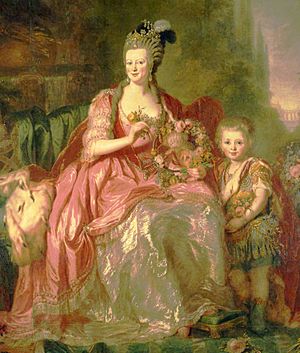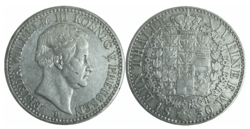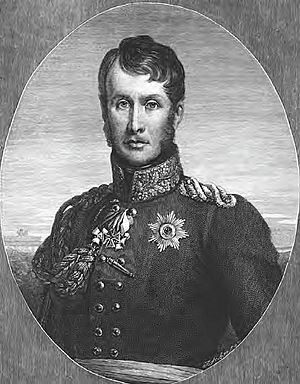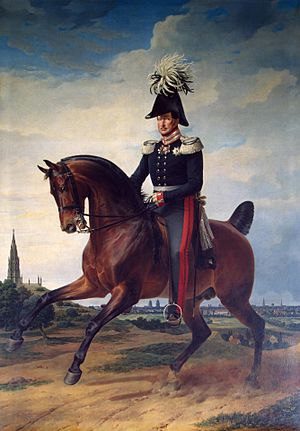Frederick William III of Prussia facts for kids
Quick facts for kids Frederick William III |
|
|---|---|
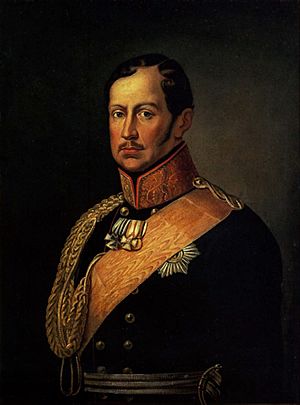
Portrait from c. 1814–1818.
|
|
| King of Prussia | |
| Reign | 16 November 1797 – 7 June 1840 |
| Predecessor | Frederick William II |
| Successor | Frederick William IV |
| Elector of Brandenburg | |
| Reign | 16 November 1797 – 6 August 1806 |
| Predecessor | Frederick William II |
| Successor | Electorate abolished |
| Born | 3 August 1770 Potsdam, Prussia |
| Died | 7 June 1840 (aged 69) Berlin, Prussia |
| Burial | Mausoleum at Charlottenburg Palace |
| Spouses |
|
| Issue see details... |
|
| House | Hohenzollern |
| Father | Frederick William II of Prussia |
| Mother | Frederica Louisa of Hesse-Darmstadt |
| Religion | Calvinist (until 1817) Prussian United (after 1817) |
| Signature |  |
Frederick William III (German: Friedrich Wilhelm III.) was the King of Prussia from 1797 until his death in 1840. He was also the Elector of Brandenburg until 1806, when the Holy Roman Empire ended.
Frederick William III ruled Prussia during the challenging period of the Napoleonic Wars. He was not eager to join the fight against Napoleon, but he eventually did. After Napoleon's defeat, he attended the Congress of Vienna, a big meeting to sort out Europe's future. His main focus was on reforming Prussia's Protestant churches. He wanted to unite them and give the king more control. Frederick William was known for being shy and often unsure of himself. His wife, Queen Louise, was his most important helper and advisor. She led a group of smart people who worked to improve Prussia's government, finances, and army. He was an ancestor to important rulers like Tsar Nicholas II of Russia and Kaiser Wilhelm II. The famous composer Beethoven dedicated his Ninth Symphony to him in 1824.
Contents
Early Life and Family
Frederick William was born in Potsdam on August 3, 1770. His parents were Frederick William II of Prussia and Frederica Louisa of Hesse-Darmstadt. He was a quiet and shy boy, often speaking very little. He felt neglected by his father, which made him feel unsure of himself throughout his life.
Like many royal children, Frederick William was raised by tutors. He spent time at Paretz, a country estate he later bought because he liked it so much. He grew up to be a honest and religious person.
He trained as a soldier, which was typical for a Prussian prince. He fought in campaigns against France between 1792 and 1794. On December 24, 1793, Frederick William married Louise of Mecklenburg-Strelitz. They had ten children together. Their marriage was happy, and Queen Louise was very popular with the Prussian people. This helped make the royal family more liked.
His Time as King
Frederick William became king on November 16, 1797. He immediately tried to show he was a good ruler. He cut down royal spending and tried to fix problems from his father's time. He wanted to keep personal power but wasn't always good at using it. He found it hard to trust his ministers, which sometimes made his rule less effective.
He also wanted to bring back respect to his family's name. At first, Frederick William and his advisors tried to stay neutral during the Napoleonic Wars. They managed to avoid the Third Coalition in 1805. However, Queen Louise convinced him to join the war in October 1806.
Prussia suffered a huge defeat at the Battle of Jena–Auerstedt on October 14, 1806. The French army, led by Napoleon, crushed the Prussian forces. Napoleon then took over Berlin. The royal family had to escape to Memel in East Prussia, where they relied on the help of Emperor Alexander I of Russia.
Alexander also lost battles to the French. At Tilsit, France made peace with Russia and Prussia. Napoleon was very harsh with Prussia. Even though Queen Louise met with Napoleon, hoping to make things easier, he showed little mercy. Prussia lost many lands and had to pay a lot of money to France. French troops also stayed in key Prussian areas.
Even though the king seemed to accept Prussia's difficult situation, many smart ministers worked to reform the country. These included Baron vom Stein and Prince von Hardenberg. Queen Louise encouraged these reforms, but she sadly passed away in 1810. After her death, Frederick William relied more on a group of close advisors.
In 1813, after Napoleon's army was defeated in Russia, Frederick William finally turned against France. He made an alliance with Russia. Prussian troops played a very important role in the victories of 1813 and 1814. The king himself traveled with the main army.
At the Congress of Vienna, Prussia gained more land. However, they didn't get everything they wanted. After the war, Frederick William became more traditional. He went back on his promises to give Prussia a constitution.
Uniting the Churches
Frederick William wanted to unite the Protestant churches in Prussia. He aimed to make their worship, organization, and buildings similar. His long-term goal was for the king to have full control over all Protestant churches.
Merging the Lutheran and Calvinist churches was very controversial. Many people, especially the "Old Lutherans," strongly disagreed. The king tried to stop the protests. Some Lutherans were forced to join, and their churches were taken over. Some pastors were even sent away. By 1834, the churches were officially united, but many still had different beliefs. The king's strong actions caused tension within the government.
The Church of the Prussian Union was formed, bringing together the two main Protestant groups. This meant the Prussian government had full control over church matters, with the king acting as the main leader.
In 1824, Frederick William III married again to Countess Auguste von Harrach. This was a special type of marriage where their children would not inherit royal titles. They did not have any children together.
In 1838, the king gave parts of his land to 422 Protestant refugees from Austria. These refugees built homes in a special style in the Silesian village.
Death of the King
Frederick William III passed away on June 7, 1840, in Berlin, due to a fever. His eldest son, Frederick William IV, became the next king. Frederick William III is buried in the Mausoleum at Charlottenburg Palace in Berlin.
His Children
Frederick William III had ten children with his first wife, Queen Louise.
| Name | Birth | Death | Notes |
|---|---|---|---|
| (daughter, no name) | 1 October 1794 | 1 October 1794 | Born still. |
| Frederick William IV of Prussia | 15 October 1795 | 2 January 1861 | Became King of Prussia. Married Elisabeth Ludovika of Bavaria, no children. |
| William I, German Emperor | 22 March 1797 | 9 March 1888 | Later became the first German Emperor. Married Augusta of Saxe-Weimar-Eisenach, had children. |
| Princess Charlotte of Prussia | 13 July 1798 | 1 November 1860 | Married Nicholas I of Russia, who became Emperor of Russia. They had children, including the future Alexander II of Russia. |
| Princess Frederica of Prussia | 14 October 1799 | 30 March 1800 | Died as a baby. |
| Prince Charles of Prussia | 29 June 1801 | 21 January 1883 | Married Princess Marie of Saxe-Weimar-Eisenach. They had children. |
| Princess Alexandrine of Prussia | 23 February 1803 | 21 April 1892 | Married Paul Friedrich, Grand Duke of Mecklenburg-Schwerin. They had children. |
| Prince Ferdinand of Prussia | 13 December 1804 | 1 April 1806 | Died as a young child. |
| Princess Louise of Prussia | 1 February 1808 | 6 December 1870 | Married Prince Frederik of the Netherlands. They had children. |
| Prince Albert (Albrecht) of Prussia | 4 October 1809 | 14 October 1872 | Married Princess Marianne of the Netherlands and later Rosalie von Rauch. He had children from both marriages. |
Honors and Awards
Frederick William III received many honors from different countries during his life. These awards showed his importance and the alliances Prussia had.
 Prussia:
Prussia:
- Knight of the Black Eagle, 11 September 1772
- Founder of the Iron Cross, 10 March 1813
- Founder of the Order of Louise, 13 August 1814
 Russian Empire:
Russian Empire:
- Knight of St. Andrew, 29 January 1780
- Knight of St. Alexander Nevsky, 29 January 1780
 Sweden:
Sweden:
- Knight of the Seraphim, 23 December 1797
- Grand Cross of the Sword, 1st Class, 6 February 1814
- France:
 French Empire: Grand Eagle of the Legion of Honour, March 1805
French Empire: Grand Eagle of the Legion of Honour, March 1805 Kingdom of France:
Kingdom of France:
- Knight of the Holy Spirit, 1815
- Knight of St. Michael, 1815
 Austrian Empire: Knight of the Military Order of Maria Theresa, 1813
Austrian Empire: Knight of the Military Order of Maria Theresa, 1813 Spain: Knight of the Golden Fleece, 30 May 1814
Spain: Knight of the Golden Fleece, 30 May 1814 United Kingdom: Knight of the Garter, 9 June 1814
United Kingdom: Knight of the Garter, 9 June 1814 Denmark: Knight of the Elephant, 31 August 1814
Denmark: Knight of the Elephant, 31 August 1814 Netherlands: Grand Cross of the Military William Order, 9 July 1821
Netherlands: Grand Cross of the Military William Order, 9 July 1821 Saxe-Weimar-Eisenach: Grand Cross of the White Falcon, 1 March 1823
Saxe-Weimar-Eisenach: Grand Cross of the White Falcon, 1 March 1823 Baden:
Baden:
- Grand Cross of the House Order of Fidelity, 1823
- Grand Cross of the Zähringer Lion, 1823
 Kingdom of Portugal: Grand Cross of the Sash of the Three Orders, 30 August 1825
Kingdom of Portugal: Grand Cross of the Sash of the Three Orders, 30 August 1825 Kingdom of Bavaria: Knight of St. Hubert, 1826
Kingdom of Bavaria: Knight of St. Hubert, 1826 Kingdom of Sardinia: Knight of the Annunciation, 6 May 1833
Kingdom of Sardinia: Knight of the Annunciation, 6 May 1833

 Ernestine duchies: Grand Cross of the Saxe-Ernestine House Order, November 1834
Ernestine duchies: Grand Cross of the Saxe-Ernestine House Order, November 1834 Kingdom of Saxony: Knight of the Rue Crown, 1836
Kingdom of Saxony: Knight of the Rue Crown, 1836 Grand Duchy of Hesse: Grand Cross of the Ludwig Order
Grand Duchy of Hesse: Grand Cross of the Ludwig Order Two Sicilies:
Two Sicilies:
- Knight of St. Januarius
- Grand Cross of St. Ferdinand and Merit
 Württemberg: Knight of the Golden Eagle
Württemberg: Knight of the Golden Eagle
Siblings
Frederick William III had several brothers and sisters:
- Frederica Charlotte (1767–1820), who married Frederick, Duke of York.
- Christine (1772–73)
- Louis Charles (1773–96)
- Frederica Louisa Wilhelmina (1774–1837), who became Queen of the Netherlands.
- Augusta (1780–1841)
- Henry (1781–1846)
- William (1783–1851)
See also
 In Spanish: Federico Guillermo III de Prusia para niños
In Spanish: Federico Guillermo III de Prusia para niños


